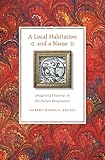A Local Habitation and a Name : Imagining Histories in the Italian Renaissance / Albert Russell Ascoli.
Material type: TextPublisher: New York, NY : Fordham University Press, [2022]Copyright date: ©2011Description: 1 online resource (384 p.)Content type:
TextPublisher: New York, NY : Fordham University Press, [2022]Copyright date: ©2011Description: 1 online resource (384 p.)Content type: - 9780823234295
- 9780823290772
- online - DeGruyter
| Item type | Current library | Call number | URL | Status | Notes | Barcode | |
|---|---|---|---|---|---|---|---|
 eBook
eBook
|
Biblioteca "Angelicum" Pont. Univ. S.Tommaso d'Aquino Nuvola online | online - DeGruyter (Browse shelf(Opens below)) | Online access | Not for loan (Accesso limitato) | Accesso per gli utenti autorizzati / Access for authorized users | (dgr)9780823290772 |
Frontmatter -- Contents -- Acknowledgments -- Introduction -- PART I. Petrarch and Boccaccio -- PART II. Machiavelli and Ariosto -- PART III. Tasso -- Bibliography -- Index
restricted access online access with authorization star
http://purl.org/coar/access_right/c_16ec
Focusing on major authors and problems from the Italian fourteenth and sixteenth centuries, from Petrarch and Boccaccio to Machiavelli, Ariosto and Tasso, A Local Habitation and a Name examines the unstable dialectic of “reality” and “imagination,” as well as of “history” and “literature.” Albert Ascoli identifies and interprets the ways in which literary texts are shaped by and serve the purposes of multiple, intertwined historical discourses and circumstances, and he equally probes the function of such texts in constructing, interpreting, critiquing, and effacing the histories in which they are embedded. Throughout, he poses the theoretical and methodological question of how formal analysis and literary forms can at once resist and further the historicist enterprise. Along the way Ascoli interrogates the mechanisms of historical periodization that have governed for so long our study of what is sometimes called the “Renaissance,” sometimes the early modern period. He also addresses the period’s own unstable version of the literature/history opposition, the place of gendered discourse in the construction of historical narratives (and vice versa), the elaborate formal strategies by which poets and intellectuals negotiate their relations to power, and, finally, the way in which proper names (of authors, works, and exemplary characters) serve as points of negotiation between individual identity and social order in the Renaissance. The book brings to culmination two decades of a major scholar’s thinking about some of the most important figures and questions that shaped the Renaissance, with emphasis on the question of history, both the historical context of literature and the writing of literary history.
Mode of access: Internet via World Wide Web.
In English.
Description based on online resource; title from PDF title page (publisher's Web site, viewed 03. Jan 2023)


